Fantasia Diary 2015: They Look Like People, Nina Forever, and Hostile
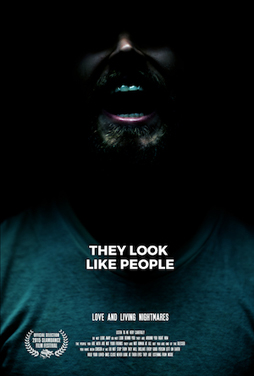 Concluding my discussion of films I saw courtesy of the Fantasia screening room, I’ll be writing today about three movies: a drama with elements of horror called They Look Like People, the horror-comedy called Nina Forever, and one of the purest horror movies I’ve ever seen, Nathan Ambrosioni’s Hostile. I’ll begin with They Look Like People, written and directed by Perry Blackshear. It’s about two men, one of whom, Wyatt (MacLeod Andrews), appears to be falling into insanity; he believes aliens are giving him messages. He happens to cross paths with his old friend Christian (Evan Dumouchel). They’ve both recently had long-term relationships fall apart — Wyatt’s fiancée in fact cheated on him and then broke up with him. Christian offers Wyatt a place to stay, and Wyatt accepts.
Concluding my discussion of films I saw courtesy of the Fantasia screening room, I’ll be writing today about three movies: a drama with elements of horror called They Look Like People, the horror-comedy called Nina Forever, and one of the purest horror movies I’ve ever seen, Nathan Ambrosioni’s Hostile. I’ll begin with They Look Like People, written and directed by Perry Blackshear. It’s about two men, one of whom, Wyatt (MacLeod Andrews), appears to be falling into insanity; he believes aliens are giving him messages. He happens to cross paths with his old friend Christian (Evan Dumouchel). They’ve both recently had long-term relationships fall apart — Wyatt’s fiancée in fact cheated on him and then broke up with him. Christian offers Wyatt a place to stay, and Wyatt accepts.
Much of the film is about the two men rediscovering their friendship. It’s a solid character piece, as we see how they come to mean a lot to each other. Christian isn’t mentally troubled the way Wyatt is, but lacks self-confidence, or feels he does; he listens to self-help affirmations we eventually learn were recorded by his ex-girlfriend. We also learn the affirmations aren’t necessarily having the effect he wants. They do give him the courage to ask out his boss, Mara (Margaret Ying Drake); but then Wyatt begins to fixate on her, believing she’s an ally against the evil aliens around them. As things go on, the friendship of the two men is increasingly tested.
The movie’s essentially about the friendship between Wyatt and Christian, and at its best it’s a touching depiction of male friendship, one that’s neither sophomoric nor overdetermined. These aren’t older men with shared decades, they’re acquaintances who become best buddies. They Look Like People is far from being a comedy, but there’s a warmth to the movie that’s quite effective despite the dark things happening to Wyatt.
 More broadly, the movie can be said to be about gender, and about two men trying to live up to their images of manhood. Wyatt’s an extreme case, as his mental illness grows worse and worse, and the voices in his head accuse him of being “soft.” But Christian’s working through similar issues, albeit less dramatically. “You have no idea what it’s like not to feel like a wuss any more,” he tells Wyatt after asking out Mara. The affirmations he listen to are vital to his self-image. He wants to be chivalrous, he wants to be strong, and there’s something a little sad in that. His actions at the climax show a real strength in a non-traditional way; he simply doesn’t realise what his strength is.
More broadly, the movie can be said to be about gender, and about two men trying to live up to their images of manhood. Wyatt’s an extreme case, as his mental illness grows worse and worse, and the voices in his head accuse him of being “soft.” But Christian’s working through similar issues, albeit less dramatically. “You have no idea what it’s like not to feel like a wuss any more,” he tells Wyatt after asking out Mara. The affirmations he listen to are vital to his self-image. He wants to be chivalrous, he wants to be strong, and there’s something a little sad in that. His actions at the climax show a real strength in a non-traditional way; he simply doesn’t realise what his strength is.
On the other hand, Mara’s described as intimidating, someone who “makes men cry.” Once we meet her, we can see that that’s not the whole story, if it’s the story at all. She’s a well-rounded character, with likes and dislikes and thoughts of her own. The incident with Wyatt around the middle of the movie, when his mental problems become obvious, is really tragic because Mara has every right to be worried for her safety while at the same time Wyatt clearly has no intent to harm but also no sense of how his actions are being interpreted. Interestingly, after the fact, both Mara and a female friend of hers act in what might be considered traditionally male ways — threatening Wyatt with violence and in one case striking him.
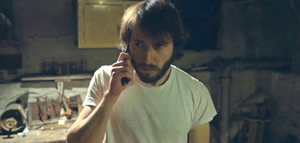 And then in the face of this competency and relaxed attitude with violence, Christian and Wyatt are clearly intimidated. In a late-night talk, Wyatt asks Christian “Do you think girls are just better at … stuff?” And Christian answers, perhaps a little unsure, “No, man, guys are better.” Whatever the case, you notice that Wyatt’s voices drive him to the hardware store to build weapons and use tools and work out how to use a nail gun. There’s a sense of masculinity, then, as not only toxic but literally insane.
And then in the face of this competency and relaxed attitude with violence, Christian and Wyatt are clearly intimidated. In a late-night talk, Wyatt asks Christian “Do you think girls are just better at … stuff?” And Christian answers, perhaps a little unsure, “No, man, guys are better.” Whatever the case, you notice that Wyatt’s voices drive him to the hardware store to build weapons and use tools and work out how to use a nail gun. There’s a sense of masculinity, then, as not only toxic but literally insane.
The movie I think succeeds as a drama because the climax is successful. You’d expect it to be an anticlimax, as a promised event (which we know is a hallucination) doesn’t happen. But the point of it is that the relationship of Wyatt and Christian is pushed to its limits. Both men end up putting each other in a situation where they have to choose between the other man and the thing that matters most to them. And the choices they make, all along the way, feel real and true. It’s the sign of a good ending: one that’s unpredictable, but which in retrospect is inevitable. They Look Like People is a very tightly-written movie, well-acted and well-directed. It’s a movie with a real heart.
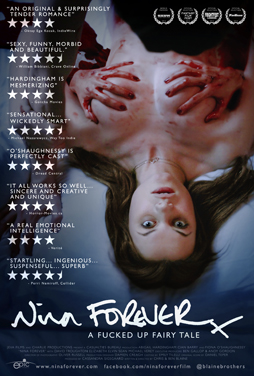 Nina Forever, written and directed by Chris and Ben Blaine, is an English film with a powerful if direct premise: Holly (Abigail Hardingham) is attracted to Rob (Cian Barry), whose last girlfriend Nina (Fiona O’Shaughnessy) died in a car crash, but when they start a relationship Holly’s disturbed to find that Nina manifests as a bloody ghost whenever Holly and Rob have sex. Put like that it sounds like a joke. The movie, to its credit, is dedicated to playing it straight.
Nina Forever, written and directed by Chris and Ben Blaine, is an English film with a powerful if direct premise: Holly (Abigail Hardingham) is attracted to Rob (Cian Barry), whose last girlfriend Nina (Fiona O’Shaughnessy) died in a car crash, but when they start a relationship Holly’s disturbed to find that Nina manifests as a bloody ghost whenever Holly and Rob have sex. Put like that it sounds like a joke. The movie, to its credit, is dedicated to playing it straight.
It’s almost, but not quite, entirely unlike a Buffy the Vampire Slayer episode: it conceives of a horror-tinged metaphor for a common emotional experience and then rides that metaphor as far as it can, accompanied by flourishes of verbal wit; so in that way it’s like Buffy, and then in every other way is completely different. It’s visually very dark, and again clever, using flash-forward and cross-cutting to highlight important sequences. Clever sonically as well, with an often diagetic indy rock soundtrack — Holly and Rob first bond when she listens to his music. And then again the movie’s also smart about using silence, whether in a social situation or to heighten an emotional effect.
Obviously the central metaphor of Nina is a man who can’t let go of his dead girlfriend. The risk is that the idea of Nina actually supernaturally returning at intimate moments between Rob and his new girlfriend becomes too obvious an image. That it becomes too limiting. I think the movie gets around that by not overexplaining anything — in a lot of ways this is very much a horror movie, and part of that comes in the way the characters fumble for anything that looks like a rule that can explain what happens and then get wrong-footed when the rule turns out not to be all-inclusive after all.
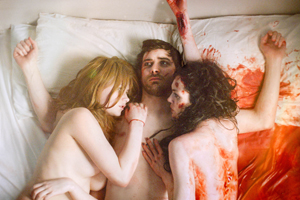 It’s also a horror movie in that there’s an awful lot of blood. Hints of blood and death hang over the film even early on; a scene begins with roadkill prominent in frame, characters run across a highway, broken glass on the floor makes an impromptu obstacle course. Holly’s a paramedic, which reflects directly on her character and ties in to the climax of the film.
It’s also a horror movie in that there’s an awful lot of blood. Hints of blood and death hang over the film even early on; a scene begins with roadkill prominent in frame, characters run across a highway, broken glass on the floor makes an impromptu obstacle course. Holly’s a paramedic, which reflects directly on her character and ties in to the climax of the film.
But all of these things pale next to the appearance of Nina. Nina’s a very literalised metaphor, bloody and scarred. Every time she appears the mattress and sheets are soaked with blood. The visuals here, as so often in the movie, are startling: Fiona O’Shaughnessy’s almost Pre-Raphaelitic beauty drowned under scabs and gore, her wide eyes popping out of the mess. Her Nina serves perfectly as the movie’s driving force, understandably bitter at being killed young and then constantly dragged back from the grave to watch her boyfriend — with whom, as she says, she never broke up — having sex with another woman. She wants nothing, she says, and while in many cases having a main character with no wants would be a problem, here it works because just by existing she herself is the cause of wants in others.
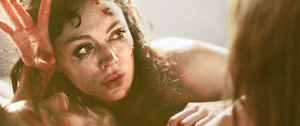 Which is to say that this is absolutely Holly’s story. It would have been easy, perhaps, to think that Rob was the main character, but in the end what happens is more to do with Holly than anyone. It’s interesting, if not significant, that the holly is an evergreen traditionally associated with fertility. The movie’s Holly is a complex character, with both a strong urge to heal and also a dark side. That said, while both Abigail Hardingham and Cian Barry are fine leads, the movie’s very nearly stolen by Elizabeth Elvin and David Troughton as Nina’s still-living parents. Troughton, in particular, is brilliant both in comic scenes, as when he forces Rob to give him feedback on his amateur novel, and (particularly) in an emotional monologue at the movie’s end. (David Troughton’s IMDB bio observes he’s the son of Patrick Troughton, who the IMDB merely refers to as a “noted Shakespearean actor.” In an unrelated note, sometimes you really want to ask the IMDB who it thinks it’s fooling.)
Which is to say that this is absolutely Holly’s story. It would have been easy, perhaps, to think that Rob was the main character, but in the end what happens is more to do with Holly than anyone. It’s interesting, if not significant, that the holly is an evergreen traditionally associated with fertility. The movie’s Holly is a complex character, with both a strong urge to heal and also a dark side. That said, while both Abigail Hardingham and Cian Barry are fine leads, the movie’s very nearly stolen by Elizabeth Elvin and David Troughton as Nina’s still-living parents. Troughton, in particular, is brilliant both in comic scenes, as when he forces Rob to give him feedback on his amateur novel, and (particularly) in an emotional monologue at the movie’s end. (David Troughton’s IMDB bio observes he’s the son of Patrick Troughton, who the IMDB merely refers to as a “noted Shakespearean actor.” In an unrelated note, sometimes you really want to ask the IMDB who it thinks it’s fooling.)
Nina Forever is a character-centred movie that ultimately locates its horror within those characters and their mundane fates. It’s surprising, and smart enough that it doesn’t need to show off how smart it is with out-of-place wit. Dialogue is overall eloquent and inventive; if the early (1990-ish) Neil Gaiman had set out to write a horror movie, it might have looked something like this. It’s a remarkable film.
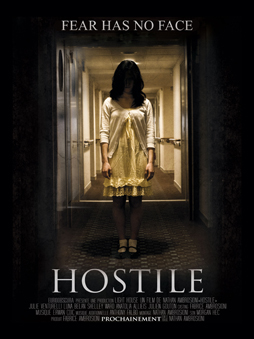 The last movie I saw from this year’s Fantasia was Nathan Ambrosioni’s Hostile. Ambrosioni was 14 when he made the movie, 16 now. I mentioned in an earlier post that I’d met him in a line-up to get in to another movie, and I decided it’d be interesting to see his work. It seemed to me that an awful lot of the movies I’d seen at Fantasia had to with teenagers, one way or another, whether portrayed realistically or as superheroes or in dystopias or in post-apocalypse worlds or in meaningful relationships or not. I felt, then, that it was only fair to give a teen the last word.
The last movie I saw from this year’s Fantasia was Nathan Ambrosioni’s Hostile. Ambrosioni was 14 when he made the movie, 16 now. I mentioned in an earlier post that I’d met him in a line-up to get in to another movie, and I decided it’d be interesting to see his work. It seemed to me that an awful lot of the movies I’d seen at Fantasia had to with teenagers, one way or another, whether portrayed realistically or as superheroes or in dystopias or in post-apocalypse worlds or in meaningful relationships or not. I felt, then, that it was only fair to give a teen the last word.
Hostile is the story of two girls, orphans named Anna (Luna Belan) and Emilie (Julie Venturelli). Emilie’s 15 and the boss, while Anna turns 14 during the movie. As the movie starts they’re living with a foster mother named Meredith Langston (Shelley Ward), but she’s noticed something strange and sinister about them. And seems to see a peculiar man lurking about. She calls for help, and ends up explaining her situation to local journalists. A babysitter comes to a bad end. An exorcist is called in. The girls seem to be very practiced at violence; as the film goes on we slowly learn what’s happening, while at the same time the violence gets more and more horrific.
To say that this is incredible film for a 14-year-old to make understates the case. It’s a remarkably solid low-budget horror movie for anyone to have made. The plot is a bit ragged — some early appearances and disappearances never seem fully explained — but on the whole coheres, while individual sequences are quite artful.
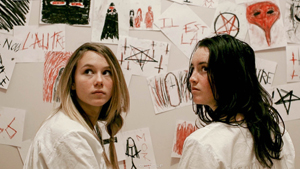 Ambrosioni’s a fan of horror movies, and you can see that not so much in deliberate homages (at least few that I, no horror fan myself, picked up) but in the way horror iconography and techniques are used. There’s an early sequence with the two girls and that icon of childhood, two tin cans with string between them making a crude telephone. Ambrosioni uses that to fashion a disturbing, frightening scene — one girl stops answering, the other girl starts to hear strange sounds, something pulls on the string to yank the can away from her. It’s well-paced and well-shot and evokes a perfect sense of dread.
Ambrosioni’s a fan of horror movies, and you can see that not so much in deliberate homages (at least few that I, no horror fan myself, picked up) but in the way horror iconography and techniques are used. There’s an early sequence with the two girls and that icon of childhood, two tin cans with string between them making a crude telephone. Ambrosioni uses that to fashion a disturbing, frightening scene — one girl stops answering, the other girl starts to hear strange sounds, something pulls on the string to yank the can away from her. It’s well-paced and well-shot and evokes a perfect sense of dread.
The movie does have a tendency to break down into individual sequences, almost like an anthology. It still holds together because the central mystery of the background of the two girls is strong enough to sustain it. They become the axle around which the rest of the film turns. Thankfully, they’re played by two strong actors. Coincidence or not, they and the other teens in the movie (including the director in a minor role) seem to outshine the puzzled and fearful adults. I’m old enough that one of the main ideas associated with ‘horror movie’ in my mind is a film in which some kind of monstrous serial killer stalks a bunch of undifferentiated teens. Here there’s a distinct sense of role reversal: the teens are wreaking havoc with clueless adults. (And if the movies I’m remembering had an awful lot to do with teen sexuality, explicitly or implicitly, here there doesn’t seem to be anything particularly sexual going on at all.)
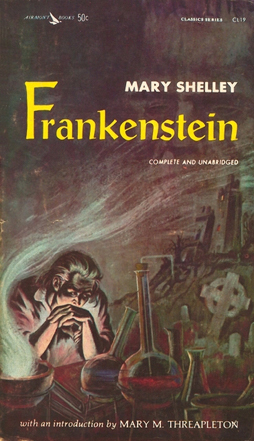 The movie uses ‘found footage’ from a number of different sources. For the most part this works, and the footage has a reasonably logical source. I’ll note that one of the few possible homages I did catch is a moment in one handheld found-footage segment where a boy named Jake is seen standing in the corner of a room in a way reminiscent of the end of the Blair Witch Project. That segment’s actually being watched by some of the other characters, and the way the characters watch inset sub-stories does justify the found-footage structure plotwise.
The movie uses ‘found footage’ from a number of different sources. For the most part this works, and the footage has a reasonably logical source. I’ll note that one of the few possible homages I did catch is a moment in one handheld found-footage segment where a boy named Jake is seen standing in the corner of a room in a way reminiscent of the end of the Blair Witch Project. That segment’s actually being watched by some of the other characters, and the way the characters watch inset sub-stories does justify the found-footage structure plotwise.
It creates, in fact, a sense very like a gothic novel from the nineteenth century. In books like Frankenstein or Dracula, the text is made up of other texts — letters and diaries and reports and so forth. So here the movie’s made up of other movies, a structural choice that fits into the long tradition of horror literature. Is there something inherently horrific about that structure? Perhaps the inherently limited knowledge of the characters in the sub-story. Or: perhaps because it places the characters reading or watching a sub-story in exactly the position of the reader or viewer watching the main story. They’re doing what we’re doing, or we’re doing what they’re doing, and if they’re in so much trouble and don’t even realise it then we …
It’s interesting to consider, and I think speaks to one of the strengths of Hostile, the joy it takes in horror-movie conventions. It doesn’t so much invert those conventions, or does so only occasionally; mostly it extends them, applying them in new ways, and showing why they work. It’s absolutely a movie primarily for horror fans. But it’s also a solid piece of craft, announcing a new voice in horror cinema.
(You can find links to all my 2015 Fantasia diaries here.)
Matthew David Surridge is the author of “The Word of Azrael,” from Black Gate 14. His ongoing web serial is The Fell Gard Codices. You can find him on Facebook, or follow his Twitter account, Fell_Gard.
Hi Matthew, It’s a real pleasure to read again this article. Many cheers.
Fabrice and Nathan